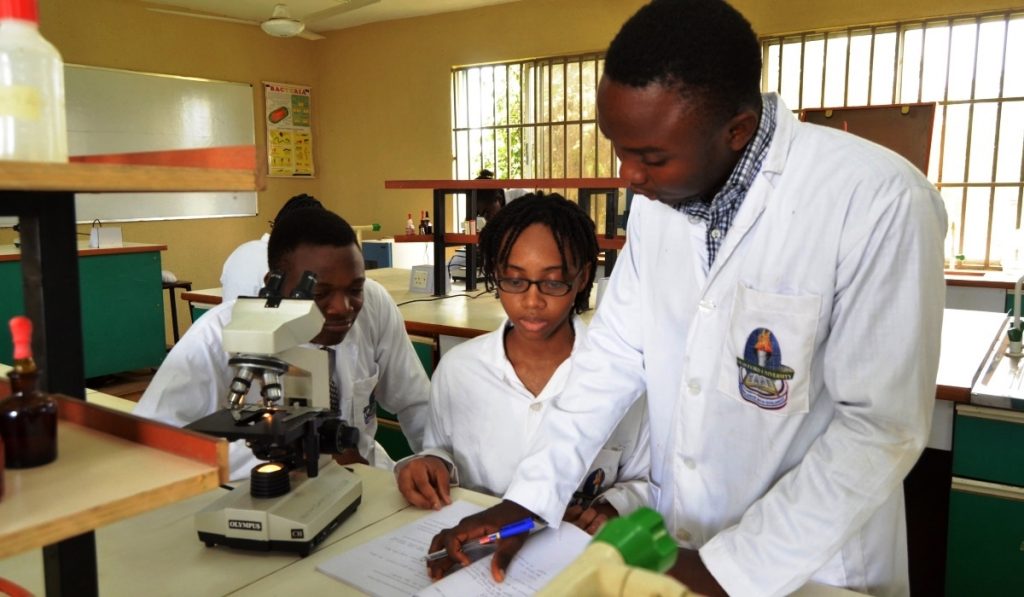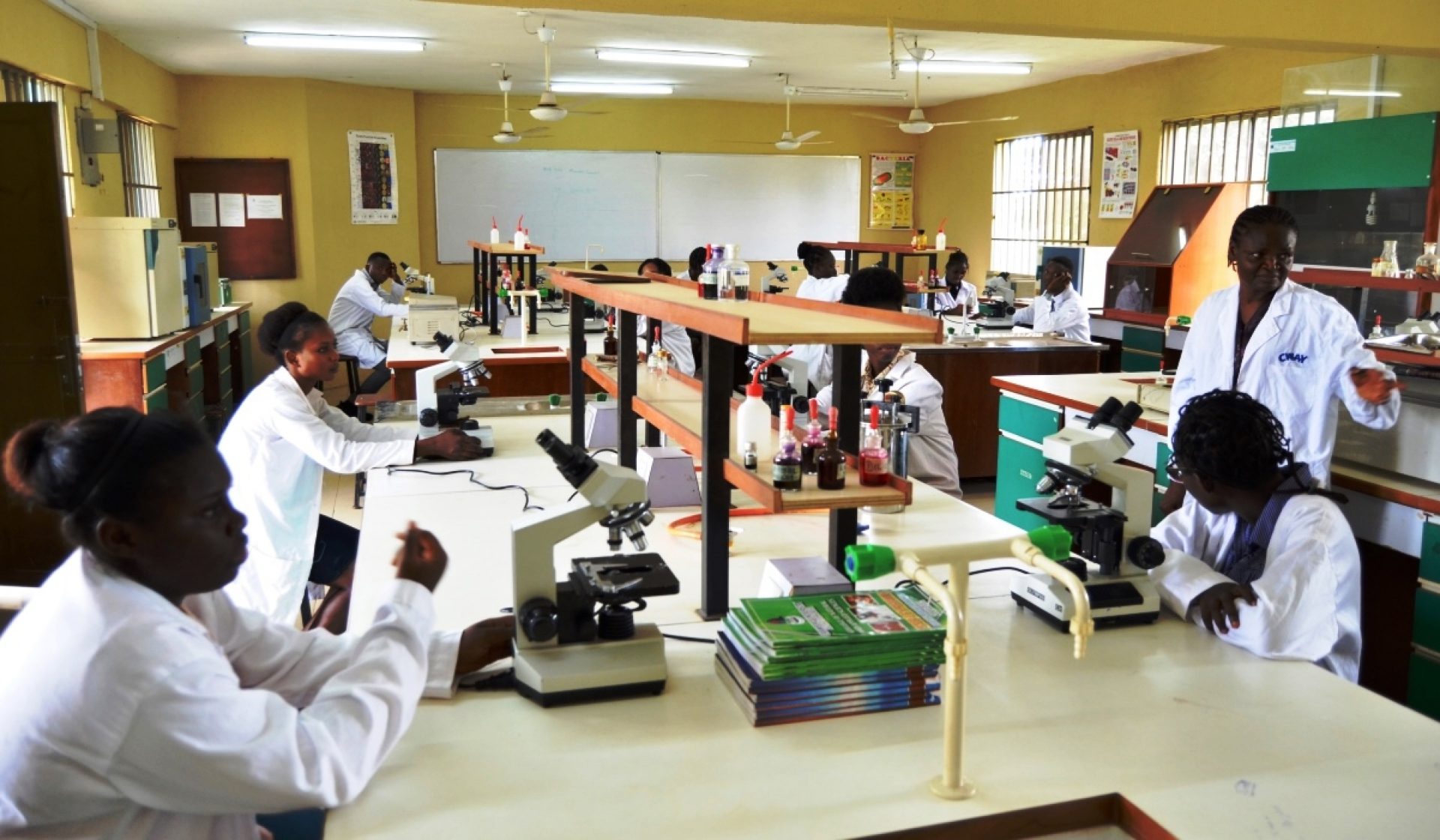
Programme Coordinator, Biological Sciences
Welcome to Microbiology
The Department is fully committed to the dissemination of knowledge with godliness in line with the main goal of Crawford University. Lecture delivery is stylish with adequate technological advancement thereby enhancing the critical reasoning of our students. Academic curricular are regularly updated with compliance to fast evolution of knowledge and development in the fields of Life Sciences. Lecture materials and practical manuals are also rich and well packaged with relevant knowledge application. The department is blessed with a cross section of dedicated and well qualified academic staff with profound passion to impact knowledge and are given to the making of outstanding graduates that are ready to take the world by storm. This department has produced a total of 138 graduates to date with 19 in the First class including the best graduating student during the 2014/2015 convocation.
There are several ongoing researches in the two academic Programmes comprising of different areas of academic research in Life Sciences. These include drug discovery, plant pathogenesis, antimicrobial resistance monitoring within the environment and the community especially amongst healthy individuals, biochemical toxicology, toxicological studies of crude extracts of plants and algae, drug metabolism, immunochemistry, enzymology, lipid and environmental biochemistry, membrane biochemistry research and many more……APPLY NOW
Microbiology Programme

Philosophy and Objectives
Level Advisers
- 100 Level Dr Banjo, +234 703 012 1326 Voice | SMS | WhatsApp
- 200 Level Dr. Faboyede A, +234 803 564 5719 Voice | SMS | WhatsApp
- 300 Level Mrs. Okonofua C, +234 805 204 4283 Voice | SMS | WhatsApp
- 400 Level Dr. Agbaje-Daniels, +234 803 376 8971 Voice | SMS | WhatsApp
COURSE CONTENTS
100 Level
Harmmattan Semester
BIO 111 General Biology I 3 Credits
History of Biology. Characteristics and classification of living things. Cellular basis of life, structure and organization of plant and animal cells. Functions of cells and cell organelles. Cell division, General reproduction. The inter-relationships of organisms. Heredity and Evolution. Elements of ecology and habitats.
Factors controlling the distribution of animals. Communities and populations. Man and environment. 30h, 45h(P).
BIO 113 General Biology I Practical 1 Credit
Rain Semester
BIO 112 General Biology ІІ 3 Credits
Varieties of life. Nomenclature and classification of animals. Diagnostic features of ten major animal phyla and their classes. Structure and functions of organs and organ systems in vertebrates e.g. Rat.
Diversity, morphology and general characteristics of viruses, bacteria, fungi, algae, bryophytes, pteridophytes, gymnosperms, angiosperms structure and functions of main organs in angiosperms.
30h (T). 45h (P)
BIO 114 General Biology II Practical 1 Credit
200 Level
Harmmatan Semester
BIO 205 Lower Invertebrate
The logy of Amoeba, paramecium. Plasmodium; Leucosolenia, Obelia, hydra, Aurel
Actinia, Dugesia, Fasciola, tenia, Ascaris, Hyperriodirilus, nereis, Hirudo, Achachatina.
Aspatheria,Sepia, macrobrachium, Lycosa, Polydesmus, Periplaneta and Asterepecten-to illustrate the classification organization, evolutionalry trends and divers of invertebrates.
30h (T) 45h (P)
BCH 211 Structure and Chemistry of Macromolecules 3 Credits
Biological membrane. Chemistry and structure of Amino acids and proteins. Chemistry of and structure of lipids. Chemistry and structure of carbohydrates. Membrane fluidity. Transport in membrane. Vitamins and Co-enzymes.
MCB 201. General Microbiology 3 Credits
Pure and Applied aspects of Microbiology. Organization of prokaryotic and eukaryoti cells. Structure, general characteristics and reproduction of viruses, bacteria and fungi. Systematic classification of microorganisms. General methods for studying the specified groups. Microbial variation and heredity. Economic importance of Microorganisms
MCB 203 Basic Techniques in Microbiology 2 Credits
Culturing of microorganisms; preparation of media for microbial growth. Isolation of pure culture; streaking pour plates etc; sub culturing procedures. Staining techniques for differentiation of microorganisms. Enumeration of Microorganisms, direct and indirect procedures. Identification of microorganisms to include colonial and cellular morphology and biochemical procedures. 45h (P):
MCB 205 Basic Invertebrate Zoology 3 Credits
The logy of Amoeba, Paramecium. Plasmodium; Leucosolenia, Obelia, Hydra, Aurel Actinia, Dugesia, Fasciola, Tenia, Ascaris, Hyperiodirilus, Nereis, Hirudo, Achachatina. Aspatheria, Sepia, Macro-brachium, Lycosa, Poly-desmus, Peri-planeta and Asterepecten – to illustrate the classification organisation, evolutionary trends and divers of invertebrates.
MCB 207 Microbial Taxonomy and Nomenclature 1 Credit
Introduction and overview. Microbial identification, naming and classification. Sytematics and new molecular techniques. Domains of living organisms- Eubacteria, Archaea and Eukarya. Taxonomic ranking, Classification Systems- Natural and Phenetic systems. Numerical Taxonomy. Major Characteristics Used in Taxonomy. Major Characteristics Used in Taxonomy. Classical characteristics and Genetic characteristics.
Rain Semester
BIO 202 General Ecology
Concept and definition of ecosystem, ecology at community level, ecological classification of habit types, terrestrial and aquatic biomass, specific features of each. Biotic components of habitat. Natural destruction, Commnuities and population, factors of communities, success of community interaction, natural cycle, dynamics of population. Succession and climax. 30h (T) 45h (P)
BIO 204 Introductory Physiology 2 Credits
Physical and chemical processes in basic plants and animal physiology. Basic elements of respiration, photosynthesis, transportation or circulation. Reproduction, germination, growth, hormones and Enzymology.
BIO 206 Systematics and Morphology of Plants 2 Credits
Comparative vegetative and reproductive morphology of gymnosperms and angiosperms. Heterospory and the concept of the seed. Classification of selected angiosperm families.
BIO 208 Introductory Genetics and Evolution 3 Credit
Principles of inheritance, structure and behaviour of chromosomes. Nucleic acid and genes. Sex determination. Gene action variation. Hereditable and non-hereditable characteristics, Probability and test of goodness of quantitative inheritance. Variation in genome structure, introduction to population genetics. Evolution and speciation.
BIO 210 Basic Chordate Zoology 3 Credits
The biology of Balanoglossus, Ciema, Branchiostoma, Petromyzon, Scolidon, Tilapia, Bufo, Agama, Colubia and Rattus to illustrate the classification, organisation evolutionary trends and diversity of chordates.
MCB 202 General Microbiology II 3 Credits
300 LEVEL
Harmmatan Semester
BIO 305 Economic Botany.
Botanical characterristics, cultivationanduseds of economic plants in nigerial-fibre, rubber, oil cocoa, coffee, kola, grains, pulses, tubers, vegetables etc. Toxicological and phyrmaceutical importance of plant products
30h (T); 45(P)
BIO 301 Biology of Tropical parasites
General concept of parasitism. Host-parasite relationship. Classification, morphology, life cycles and adaptations of selected protozoan platyhelminth and nematode parasites
30h (T) 45 (P)
MCB 301 Microbial Physiology and Metabolism 3 Credits
Dynamics of growth. Nutrition and energy metabolism of microorganisms. Effect of physical and chemical factors on growth. Biochemistry of various microbial processes such as transport, regulation and respiration. Biosynthesis of microbial products. Buffer preparation and standardization. Basic separation techniques in microbiology, dialysis, salting out, gel filtration, electrophoresis etc. assay techniques for various metabolites including microbial enzymes, acids etc.
MCB 307 Immunology 3 Credits
Introduction. Historical background. Innate and acquired immunity. Antigens, antibodies, cellular immunity. Immunological tolerance and suppression. Surgical grafting. Complement system. Hypersensitivity. Immunological anomalies. Diagnostic immunology, Vaccines, effectors systems of parasite killing and nature of resistance in plants.
MCB 305 Microbial Genetics and Molecular Biology 3 Credits
Principles of genetic analysis, Plasmids and transposable genetic elements, mutagenesis and DNA repairs, bacteriophage genetics and genetics of Nitrogen fixation. Mechanism and nature of mutation, induction, isolation and characterization of mutants. Genetic recombination in prokaryotes including transformation, transduction, phage conversion and conjugation. Recent techniques in microbial genetics. Chemical coding and expression of genetic information. Fungal genetics. Principles and application of genetic engineering.
MCB 309 Bacteriology 3 Credits
Prokaryotic structure and function. Bacterial growth and nutrition. Classification, isolation and characterization of principal groups of bacteria. Special group of bacteria and their uniqueness.
MCB 313 Virology 2 Credits
Structure, properties and classification of viruses. Principles of isolation, cultivation and maintenance of plant and animal cells in vivo. Application of cell culture technique in virology. Viruses as agents of diseases in animals.
Rain Semester
MCB 302Biodeterioration 2 Credits
Principles of microbial deterioration of materials. Material subject to microbial deterioration: Foods, jet fuels, paper, paints, textiles and leather, metals etc. Factors favouring deterioration of materials. Major microbial groups involved in the deterioration. Impact of processing and new technologies on bio deterioration. Bio deterioration control.
MCB 304 Medical Virology 2 Credits
Introduction and overview. Classification of viruses. Replication Viruses implicated with human diseases, symptoms, diagnosis and management. The Retroviruses and the diseases caused. Treatment of viral diseases. Viruses and epidemics. Viral infections and genetic variations. Epidemiology of viral infections.
MCB 306 Microbial Ecology 3 Credits
Microorganisms and ecological theory. Symbiosis and the different types that exist. Mechanisms of adaptation of microorganisms to their environment. An overview of occurrence of microorganisms in soil, water and air. Impact assessment of microbial contamination of soil, water, and air in relation to the deterioration of the environment. Growth of microbes on cell surfaces- Biofilm and its importance. Biogeochemical cycling.
MCB 308 Mycology 2 Credits
Mycological techniques. Detailed account of the systematic, morphology, reproduction and life cycles of selected fungal groups. Metabolites of fungi, Industrial uses of fungi. Fungi in medicine.
MCB 310 Medical Bacteriology 2 Credits
An overview of bacterial diversity. Different species of bacteria of medical importance. The different bacterial general and the bacterial diseases they cause, their diagnosis and treatment. Bacterial pathogenesis and antimicrobial resistance. Major bacterial pathogens of man.
MCB 312 Microbiological Quality Control 3 Credits
Microbiological standards of water, foods, pharmaceutical and other industrial products. National and international agencies responsible for the establishment and implementation of standards specifications and relevant regulations. Methods of assessment. Plant and equipment sanitation and hygiene. Quality charts according to variables and attributes. Process quality controls.
MCB 399 Industrial Attachment 6 Credits
Industrial attachment in an establishment where microbiological practice is carried out for on the job training.
400 Level
Harmmatan Semester
MCB 401 Essays in Microbiology 2 Credits
Literature review of an approved topic in microbiology plus oral presentation. 90h (P)
MCB 403 Industrial Microbiology 3 Credits
Fermentation systems; design and use of fermenters. Microorganisms of Industrial importance. Classification of microbial products by use. Relationship between primary and secondary metabolism; characteristics, sources and strain improvement of industrial microorganism. Microbial growth and product formation in industrial processes; media for industrial fermentations. Foaming, major products of industrial Microbiology: enzyme production and immobilization; production of vitamins, amino acids, antibiotics, organic acids beer and wine etc.
30h (T); 45h (P)
MCB 405 Pathogenic Microbiology 3 Credits
Study of some microbial pathogens of plants and animals with emphasis on those prevalent in Nigeria. The geographical distribution, isolation, identification, morphology, life cycle, source of infection, transmission and the host. Ecology, clinical manifestations of specific bacterial, viral and fungal pathogens of man.
30h (T); 45h (P); PR MCB 303
MCB 407 Plant Pathology 3 Credits
Basic techniques in plant pathology. Concept of diseases. Mechanisms of plant infection Host-pathogen relationship. Epiphytotics and causes. Disease forecasting. Classification of plant diseases. Pathogens Etiology and disease cycles of some economic crops in Nigeria. Practical plant protection methods involving chemicals cultural practice and biological control.
30h (T); 45h (P); PR MCB 303
MCB 409 Microbiology of Water Sewage and Air 2 Credits
Assessment of sanitary quality of water bodies. Sources of pollution, Purification system. Characterization, treatment and disposal of sewage. Sources and distribution of microbes in the air. Dissemination and survival mechanisms. Air pollution and purification techniques. Medical and agricultural importance of air borne microbes.
MCB 413 Pharmaceutical Microbiology 3 Credits
Concept of growth and death in microorganisms. The chemistry of synthetic chemotherapeutic agents and antibiotics. Production and synthesis of antibiotics and antiseptics. Relationship of antimicrobial agents to different microbial groups: Gram positives, Gram negatives, spore formers etc. The mode of action and assay of antibiotics and antiseptics. Sensitivity and resistance as related to microbial physiology. Microbiological quality control in the pharmaceutical industry.
30h (T); 45h (P)
Rain Semester
MCB 404 Principles of Parasitology 2 Credits
Evolution of parasitic mode of life. Nature of parasitism in relation to other forms of animal association. Host-parasite relationships. Epidemiological studies and control measures of importance. Tropical diseases and the role of vector in the transmission of these diseases.
30h (T); 45h (P); PR: MCB 301
MCB 406 Epidemiology and Public Health 3 Credits
Statistical applications to epidemiology. Nature of epidemiological investigations. Spectrum of infections. Herd immunity. Latency of infections. Multi-factorial systems in epidemics. Zoonoses. Antigenic drifts. Biological products for immunization. Schedules for International control of infectious diseases.
15h (T); 45h (P); PR MCB 309
MCB 408 Soil Microbiology 2 Credits
The characteristics of soil environment; microbial flora and fauna of soil; microbial activities in soil. Nitrogen cycle, mineral transformation by microorganisms. Ecological relationship among soil pathogens. Effects of pesticides on soil microorganisms. Biodegradation and bio-
fuel generation. Microbiology of the rhizosphere. Importance if air borne microbes. 30h (T); 45h (P
MCB 410 Petroleum Microbiology 2 Credits
Detailed study of carbon cycle. Theories about the genesis of fossil fuels with emphasis on microbiological influence. Prospecting for oil by means of microbial indicators. Drilling: corrosion of pipes and equipment-microbiology of the process. Effects of oil spills on microbial ecology of seas and soils. Microbial decomposition of petroleum.
MCB 412 Food Microbiology 2 Credits
The Micro-flora of foods, relations of microorganisms to food preservation and spoilage. Food poisoning. Emphasis on new developments in Food Microbiology; Economic consequences of microorganisms in food; exploitation of microorganisms in novel processes for the production of food ingredients.
30h (T); 45h (P)
MCB 416 Introduction to Mushroom Growing Technology 2 Credits
Biology, ecology and economic importance of mushrooms. Collection, identification and preservation of mushroom. History of mushroom cultivation. Spawn production and cropping.
30h (T); 45h (P)
MCB 499 Project 6 Credits
Original research into a topic of microbiological interest chosen in consultation with a supervisor and with the permission of the head of Department.
225h (P)
Biochemistry Programme staff list
|
NAME |
QUALIFICATION |
DESIGNATION |
AREA OF SPECIALIZATION |
|
Prof. S.C.U. Nwachukwu |
B.SC., M.Sc., Ph.D |
Professor(Associate) |
Industrial and Environmental Microbiology |
|
Prof. A.A. Ajayi |
B.Sc., M.Sc., Ph.D (Ife) |
Professor (Associate) |
Microbial Physiology and Biotechnology. |
|
Prof. O.A. Babalola |
B.Sc., M.Sc., Ph.D |
Professor (Associate) |
Soil Microbiology |
|
Dr. O.A. Ogunjobi |
B.Sc., M.Sc., Ph.D (Ibadan) |
Sr Lecturer (Associate) |
Environmental Microbiology, Biotechnology |
|
Dr. (Mrs.) Adebayo-Tayo |
B.Sc., M.Sc., Ph.D. (Ibadan) |
Sr Lecturer (Associate) |
Food Microbiology |
|
Dr. F.V. Agbaje-Daniels |
B.Sc., M.Sc. (Ife), Ph.D (Lagos) |
Lecturer I |
Pharmaceutical/Medical Microbiology |
|
Dr. M.O. Adigun |
B.Sc., M.Sc., Ph.D. (FUNAB) |
Lecturer I |
Soil Microbiology |
|
Mrs. C.C. Okonofua |
B.Sc., M.Sc.(Ibadan) |
Lecturer I |
Parasitology |
|
Dr. O.A. Faboyede |
B.Sc., (Ilorin) M.Sc., Ph.D (Lagos) |
Lecturer II |
Ethnobotany/Taxonomy |
|
Dr. O. Afolabi |
DVM (Ibadan), M.Ag. (FUNAB) |
Lecturer II |
Public Health |
Non-Academic Staff
|
S/N |
Names |
Qualification |
Status |
|
1 |
Mrs. R.M. Alabi |
Final DIPNIIST (ANIST) C and G (London) |
Principal Technologist |
|
2 |
Mr. S. Ogunkorode |
N.C.E. (Secretarial |
Departmental Secretary |
|
3 |
Mrs. O. Olusegun |
W.A.E.C. |
Laboratory Assistant |
